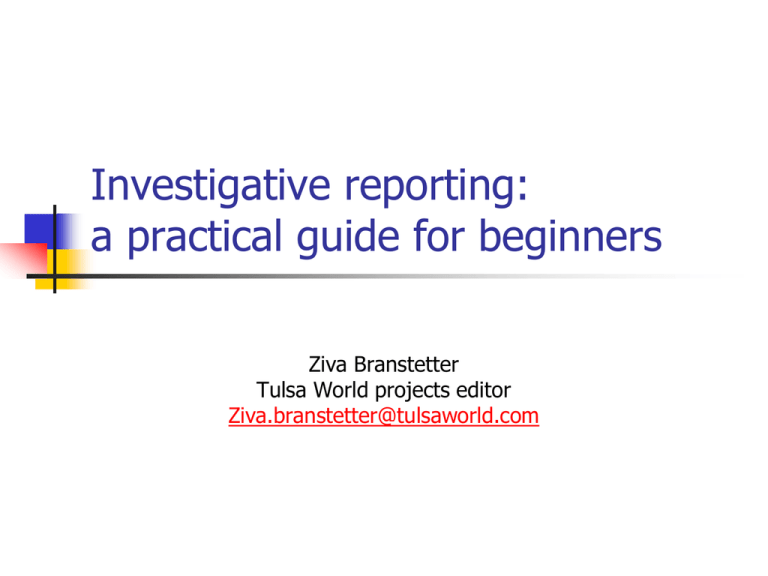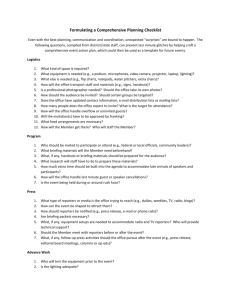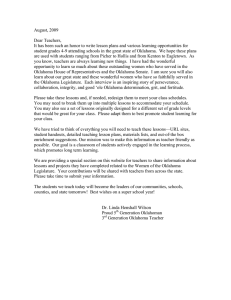Investigative Reporting by Ziva Branstetter
advertisement

Investigative reporting: a practical guide for beginners Ziva Branstetter Tulsa World projects editor Ziva.branstetter@tulsaworld.com Earning time for investigative reporting Buy time by throwing your editor a few good dailies at once and then asking for dedicated time to finish a project. Use slow times in your beat (summer for education reporters, holidays for govt. reporters) to work on projects. Consider asking to swap beats temporarily with another reporter. Have someone on a slower beat take over while you finish a project. Creating time for projects View yourself as a cook. Dailies are on the front burner, mid-range stories in the oven and long-term projects on the back burner. Try to spend some time each day working on each category. Don’t let projects sit without stirring them. Keep a running list of tasks to accomplish on your mid-range and long-term projects. When you’re waiting on phone calls or other actions for daily stories, work on those items. Gathering records before you need them Always ask for more than you need. Take a records inventory of your beat. Request the whole database, not a printout. Request every field of data, not just the ones you need now. What records are routinely created? Make a schedule and get them. Know the Open Records Act, especially the parts regarding electronic records and allowable fees. http://www.foioklahoma.org/ Track records requests. What to do with records once you have them Look for the minimum and the maximum story. Bite off a small piece for a daily story and save the rest of the information for a long-range story. Look for patterns over time. Compare with other cities, districts etc. Put databases on an intranet so other reporters can use them. http://209.184.242.51/IntranetLogin.asp Don’t forget about human sources People lead you to documents and documents lead you to people. Use both to “triangulate.’’ Cultivate sources regularly. Have a system for saving business cards, contacts etc. Spend at least some time checking out tips from sources, even those that seem unlikely to pan out. Is it worth a project or just a daily story? Is the issue important? Are there real victims? Has the story been done before? Can you break new ground by obtaining records that haven’t been released? Will it make a good human story with characters and drama? What results will likely follow? Moving a project to the front burner Collect your data and analyze it. Spend some time pre-reporting. Bounce your theory off of the experts. Look for real-world examples to back up your data. If you can’t easily find anecdotal evidence to back up your story, it might not be a story. Build internal support for your project. Make sure your top editors are on board. Talk with your editor about how much time you will need, what resources you need etc. Provide a written project proposal and update your editors regularly about your findings. Organizing your project Build a team. Database or tech support Graphics and design Photo Internet Upper editors Give your team a copy of the proposal and update members regularly. Managing the information Create a chronology, either in text or spreadsheet format. Track records requests. Which ones are outstanding? What are the obstacles? What date did they promise to give you the records? Create a spreadsheet of sources, contacts for the project. Make your own database or spreadsheet for your data. Create a common area in the system for sharing files. Now comes the hard part: writing Create an outline. What kind of presentation works best for your story? Narratives with a beginning, middle and end that build suspense. Serial narratives. Traditional multi-part series with different themes on each day. Focus on one example to tell the whole story. Follow a single case from beginning to end to show how the system works. Writing projects The rolling investigation Go with your strongest angle. Keep working on the follow-ups. Write what you don’t know as well as what you know. People are often motivated to help you fill in the blanks. Make sure potential sources know how to reach you. Go back and publish a recap story that connects all of the dots for readers. 10 issues that should be investigated in Oklahoma Write what you know: oil, agriculture, tribal issues. Why does the power to regulate corporate farming lie with the ag department instead of DEQ? How tough is the dept. on polluters? What happens when a crime is committed on Indian land, especially casinos? How often are people convicted? What are the crime rates? How independent is the state Corporation Commission, which regulates oil and gas? How much money do the commissioners get from the industry? 10 issues that should be investigated in Oklahoma Where does all the money go that tribes earn from gaming revenues? Which tribes are open with that information and which ones aren’t? Which health insurance companies in Oklahoma deny claims most often? Does the state do anything to them? What are the best and worst day-care centers? How tough is the state on bad doctors? What does it take to get a doctor’s license yanked in Oklahoma? How does that compare with other states? 10 issues that should be investigated in Oklahoma Why does Oklahoma exclude so many students from the NCLB requirements? Are we cheating? Why does our state lock up more women than almost any other state? Why are our prisons filled with drug defendants? What happens to juvenile offenders locked in adult jails? High school sports: How much recruiting goes on? How much substance abuse is there? How many kids are permanently injured? 10 investigative story ideas for beat reporters Use your city’s pet license database to find favorite pet names breeds. Or: do your city officials have their animals licensed? Use traffic ticket data to find members of the “100mile-an-hour club” or to find speed traps. Use voter registration data to find the most faithful voters, or to find elected officials who can’t make it to the polls. Use day-care center inspection data to find centers most often cited. Use jail blotter data to find people most frequently arrested or to analyze arrests by race. 10 story ideas for beat reporters Who is cited most often for code violations in your city? How often does your state environmental agency waive fines? Which city employee claims the most overtime? Who are the highest paid city (or school or county) employees? Examine teacher turnover, pay and experience at low-performing schools. How to get started Join IRE as a member and attend a conference www.ire.org Join a list-serv. IRE-plus and NICAR-L are good ones. Just lurk even if you don’t understand. You must learn basic CAR skills. Start asking for documents Find a mentor in the business


